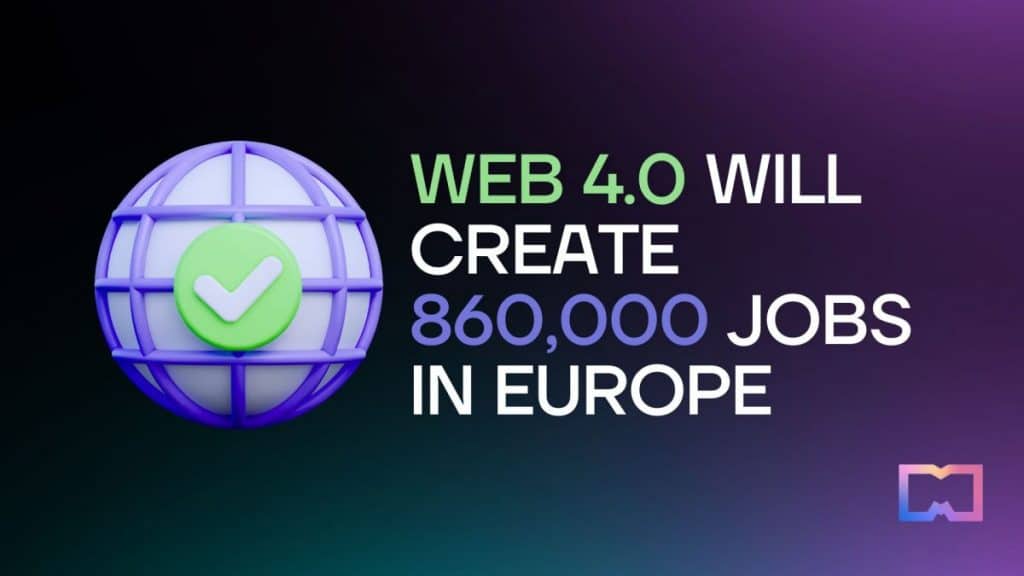The European Commission Says Web 4.0 Will Create 860,000 Jobs in Europe by 2025


In Brief
On July 11, the European Union adopted a new Web 4.0 strategy.
The strategy aims to empower people and reinforce skills; support businesses; and support virtual public services.
According to the report, by 2025, the industry will create 860,000 jobs in Europe.
Europe aims to become the leader in the Web 4.0 industry and virtual worlds. The EU plans to steer the next technological transition to guide the next technology revolution and ensure that the digital world for EU residents, businesses, and government organizations is open, secure, trustworthy, fair, and inclusive.

The new strategy, adopted by the EU on July 11, features three key pillars of digitalization. First of all, the European Union will support citizens in acquiring the skills needed for the use of the new technologies. The EU also aims to build a talent pool of virtual world specialists. According to a report, by 2025, the industry will create 860,000 jobs in Europe.
Then, the strategy focuses on helping businesses foster a European Web 4.0 industrial ecosystem. Lastly, governments will also reportedly start supporting societal progress and virtual public services. For instance, the EU plans to launch two new public initiatives: a virtual urban environment called “CitiVerse” and the “European Virtual Human Twin,” which will imitate the human body to assist medical judgments and individualized care.
The outlook of the EU economy beyond 2030 states that Web 4.0 will bring a technological transition into an immersive and seamlessly interconnected world. According to the research, the market size of the global virtual world industry is expected to grow to over €800 billion by 2030. Notably, in 2022, the market size of the sector was €27 billion.
Generally speaking, the press release explains what Web 4.0 is, saying that it will enable integration between digital and real-life objects and environments. In addition, the new era of the web will bring enhanced interactions between humans and machines. At the same time, the report emphasizes the possibility of risks brought up by such innovative technology.
“The new internet will impact the way people live together, bringing many benefits. And we need to have people at the center and shape it according to our EU digital rights and principles,”
wrote the European Commission in a tweet.
On a side note, the European Union believes that interoperable virtual worlds should not be dominated by a few big players and will cooperate with global internet governance stakeholders to promote its Web 4.0 standards.
Read more:
Disclaimer
In line with the Trust Project guidelines, please note that the information provided on this page is not intended to be and should not be interpreted as legal, tax, investment, financial, or any other form of advice. It is important to only invest what you can afford to lose and to seek independent financial advice if you have any doubts. For further information, we suggest referring to the terms and conditions as well as the help and support pages provided by the issuer or advertiser. MetaversePost is committed to accurate, unbiased reporting, but market conditions are subject to change without notice.
About The Author
Valeria is a reporter for Metaverse Post. She focuses on fundraises, AI, metaverse, digital fashion, NFTs, and everything web3-related. Valeria has a Master’s degree in Public Communications and is getting her second Major in International Business Management. She dedicates her free time to photography and fashion styling. At the age of 13, Valeria created her first fashion-focused blog, which developed her passion for journalism and style. She is based in northern Italy and often works remotely from different European cities. You can contact her at valerygoncharenko@mpost.io
More articles

Valeria is a reporter for Metaverse Post. She focuses on fundraises, AI, metaverse, digital fashion, NFTs, and everything web3-related. Valeria has a Master’s degree in Public Communications and is getting her second Major in International Business Management. She dedicates her free time to photography and fashion styling. At the age of 13, Valeria created her first fashion-focused blog, which developed her passion for journalism and style. She is based in northern Italy and often works remotely from different European cities. You can contact her at valerygoncharenko@mpost.io






















































